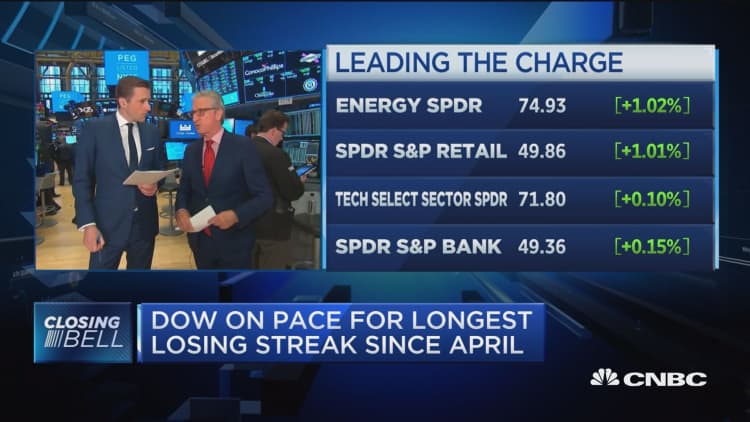
Stocks fell on Monday as a potential trade war between the U.S. and China — the world's largest economies in the world — left Wall Street rattled.
The Dow Jones industrial average dropped 103.01 points to close at 24,987.47, with Intel as the worst-performing stock in the index. The Dow also extended its losing streak to five days.
The fell 0.2 percent to 2,773.63, with telecom lagging. The Nasdaq composite meanwhile, pared losses to close flat at 7,747.03 as tech shares rose and Amazon hit an all-time high.
Shares of Boeing and Caterpillar both fell 0.9 percent. The two companies are seen as bellwethers for global trade concerns given their large amounts of overseas business.
On Friday, President Donald Trump announced that the U.S. would inflict tariffs that would impact up to $50 billion worth of Chinese goods. According to Washington, the action comes "in light of China's theft of intellectual property and technology and its other unfair trade practices."
Consequently, the move triggered China to retaliate, with Beijing announcing its own selection of duties on U.S. goods. The Chinese State Council's commission on tariffs and customs stated that a 25 percent tariff would occur in early July on $34 billion of U.S. products.
"There are many problems with tariffs. First and foremost is that they benefit far fewer people than they harm," said Ed Yardeni, president and chief investment strategist at Yardeni Research, in a note. "They are intended to boost employment in the industries that benefit from such protectionism, but they immediately raise prices of the protected goods for all consumers."
Still, stocks "may continue to zig and zag through the summer as the Jekyll and Hyde sides of Trump struggle to dominate his persona," he said. "On the one hand, there's Trump, the Deregulator and Tax-Cutter—his benevolent Dr. Jekyll persona. On the other is Trump, the Protectionist—his dark Mr. Hyde."
International markets also fell on Monday, with Asia closing lower and Europe slumping. The Stoxx 600 index, which includes a broad swath of European stocks, fell 1 percent.
Treasury prices gained and yields fell as investors looked for safety. The benchmark 10-year yield held steady at to 2.92 percent, while the short-term two-year yield declined to 2.54 percent.
"Protectionism is a real risk and it's a mounting risk," said Eric Lascelles, chief economist at RBC Global Asset Management. "Both NAFTA and U.S.-China relations look worse than they did a few months ago. The question now is how big the impact on the economy will be."
"No killer blow comes from what we have so far," Lascelles said.
Shares of Disney fell 1.6 percent after being downgraded by Pivotal Research Group analyst Brian Wieser. In a note, Wieser said its battle for key Twenty-First Century Fox assets has placed the company in an unwinnable situation.
Intel dropped 3.4 percent after Northland Capital Markets downgraded the stock to underperform from market perform, citing growing competition from AMD and Nvidia and predicting slower sales growth in its data center business.
—CNBC's Jacob Pramuk and Evelyn Cheng contributed to this report



